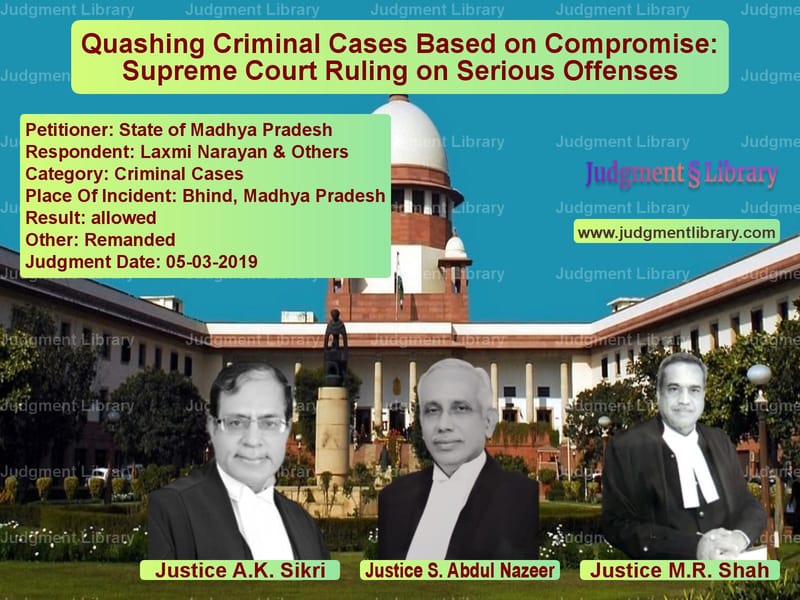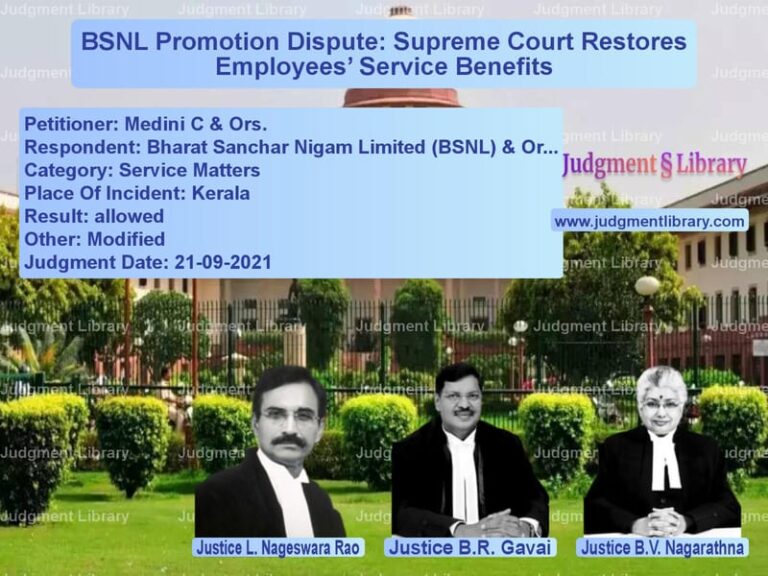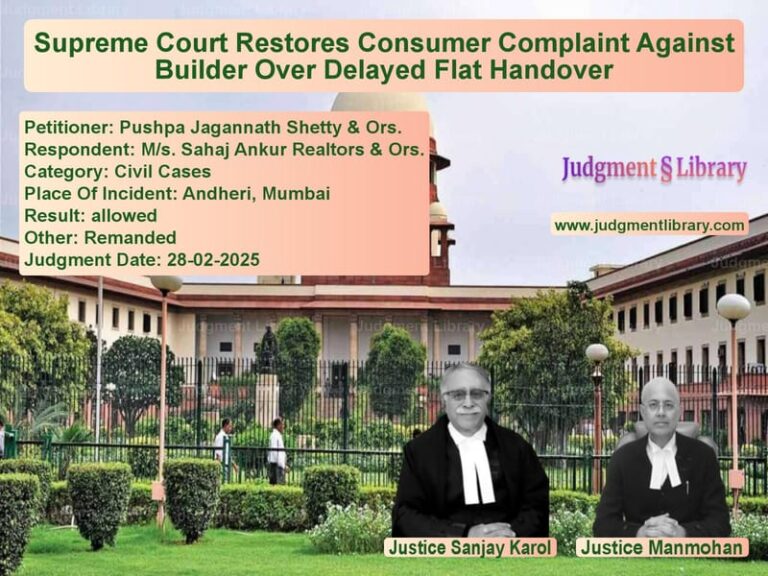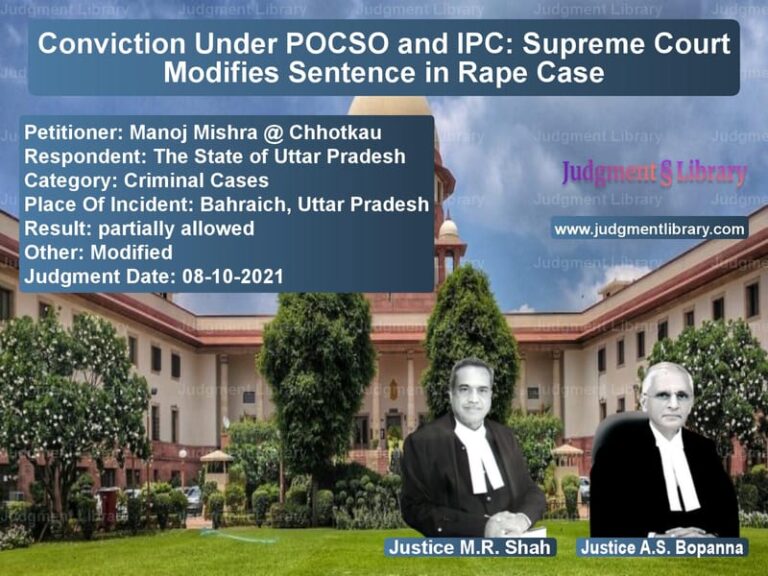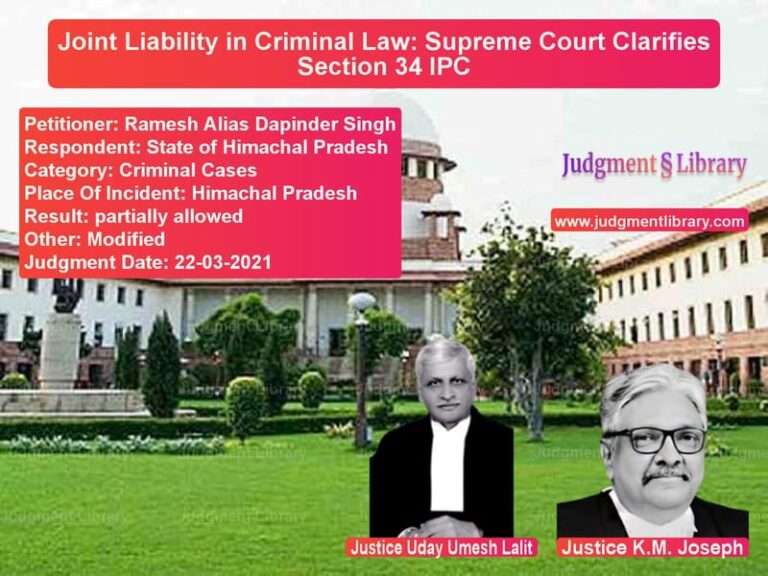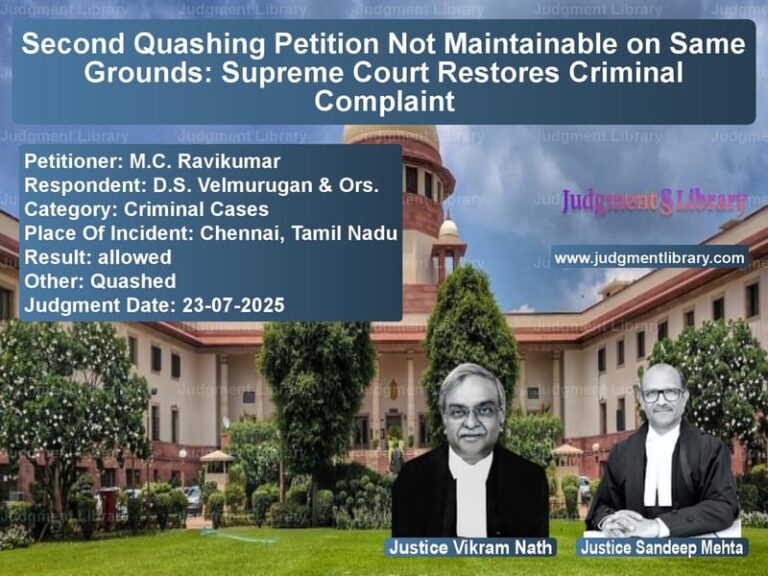Quashing Criminal Cases Based on Compromise: Supreme Court Ruling on Serious Offenses
The case of The State of Madhya Pradesh vs. Laxmi Narayan & Others is a landmark decision by the Supreme Court of India, addressing the quashing of criminal proceedings based on compromise between parties. The Court, in its judgment dated March 5, 2019, clarified the principles that govern the exercise of the High Court’s inherent powers under Section 482 of the Criminal Procedure Code (CrPC), particularly in cases involving serious offenses such as attempt to murder (Section 307 IPC).
The Supreme Court overruled the decision of the Madhya Pradesh High Court, which had quashed criminal proceedings against the accused solely on the ground of compromise between the complainant and the accused. The judgment reiterates that serious offenses affecting public interest and societal harmony cannot be quashed merely because the parties have settled their disputes.
Background of the Case
The dispute originated from an incident that took place on March 3, 2013, in Bhind district, Madhya Pradesh. The key events were:
- A complaint was lodged against the respondents under Sections 307 (attempt to murder) and 34 (common intention) of the Indian Penal Code (IPC).
- The complainant, Charan Singh, was operating an LNT machine at a sand mine when he was attacked by the accused.
- The accused, including Laxmi Narayan, Sanjeev, and Sant Singh, allegedly fired at the complainant.
- The complainant suffered bullet injuries and was admitted to the district hospital.
- Despite the severity of the offense, the complainant later reached a settlement with the accused.
- On this basis, the Madhya Pradesh High Court quashed the FIR, invoking its inherent powers under Section 482 CrPC.
The State of Madhya Pradesh challenged the High Court’s decision before the Supreme Court.
Legal Issues Raised
- Can the High Court quash a criminal case involving serious offenses like attempt to murder based solely on a compromise between the parties?
- Is Section 482 CrPC intended to be used for quashing non-compoundable offenses?
- What is the distinction between private and public offenses?
- Does quashing a serious criminal case on the basis of compromise set a dangerous precedent?
Arguments by the Petitioner (State of Madhya Pradesh)
The State of Madhya Pradesh, represented by its legal counsel, made the following arguments:
- The High Court committed a grave error in quashing an FIR for attempt to murder, which is a serious offense affecting public interest.
- The decision ignored the principle that crimes like attempt to murder are not private disputes but crimes against society.
- The High Court misinterpreted the Supreme Court’s decision in Shiji @ Pappu & Others vs. Radhika, where quashing was allowed only in cases involving private disputes.
- Even if the complainant no longer wished to pursue the case, the prosecution could still establish guilt using medical and other corroborative evidence.
- The accused had a history of criminal behavior, which the High Court failed to consider.
Arguments by the Respondent (Laxmi Narayan & Others)
The accused argued:
- The compromise between the complainant and the accused was genuine.
- Since the complainant was unwilling to testify, the trial would be a futile exercise.
- The accused had no previous criminal records, and quashing the FIR would help restore peace between the parties.
- The High Court had the inherent power under Section 482 CrPC to prevent abuse of the legal process.
Supreme Court’s Judgment
The Supreme Court ruled in favor of the State of Madhya Pradesh and set aside the High Court’s decision, stating:
- Serious offenses like attempt to murder (Section 307 IPC) cannot be quashed merely because the victim has entered into a compromise.
- The High Court mechanically quashed the FIR without considering the gravity of the offense.
- The decision in Shiji @ Pappu was misapplied since that case involved a private dispute, whereas an attempt to murder affects public safety.
- Quashing such cases sets a dangerous precedent, allowing criminals to escape punishment by reaching settlements with victims.
- The prosecution could still establish guilt through medical evidence, forensic reports, and eyewitness testimony.
The Court observed:
“The power of the High Court under Section 482 CrPC is meant to prevent abuse of the process of law and secure justice, but it cannot be used to defeat the principles of criminal jurisprudence.”
Key Takeaways from the Judgment
- High Courts cannot quash serious criminal cases based solely on compromise.
- Section 307 IPC (attempt to murder) is a crime against society, not just an individual.
- Prosecution can proceed even if the victim turns hostile, using medical and forensic evidence.
- Judicial discretion under Section 482 CrPC must be exercised with caution.
- Settlements cannot be used as a shield to evade criminal liability.
Conclusion
The Supreme Court’s ruling in The State of Madhya Pradesh vs. Laxmi Narayan & Others sets an important precedent in criminal law. It ensures that serious offenses like attempt to murder are prosecuted even if the victim reaches a settlement with the accused. The decision upholds the principle that crimes against society must be addressed through due process of law and cannot be nullified through private agreements.
Petitioner Name: State of Madhya Pradesh.Respondent Name: Laxmi Narayan & Others.Judgment By: Justice A.K. Sikri, Justice S. Abdul Nazeer, Justice M.R. Shah.Place Of Incident: Bhind, Madhya Pradesh.Judgment Date: 05-03-2019.
Don’t miss out on the full details! Download the complete judgment in PDF format below and gain valuable insights instantly!
Download Judgment: State of Madhya Prad vs Laxmi Narayan & Othe Supreme Court of India Judgment Dated 05-03-2019.pdf
Direct Downlaod Judgment: Direct downlaod this Judgment
See all petitions in Attempt to Murder Cases
See all petitions in Bail and Anticipatory Bail
See all petitions in Judgment by A.K. Sikri
See all petitions in Judgment by S. Abdul Nazeer
See all petitions in Judgment by Mukeshkumar Rasikbhai Shah
See all petitions in allowed
See all petitions in Remanded
See all petitions in supreme court of India judgments March 2019
See all petitions in 2019 judgments
See all posts in Criminal Cases Category
See all allowed petitions in Criminal Cases Category
See all Dismissed petitions in Criminal Cases Category
See all partially allowed petitions in Criminal Cases Category

